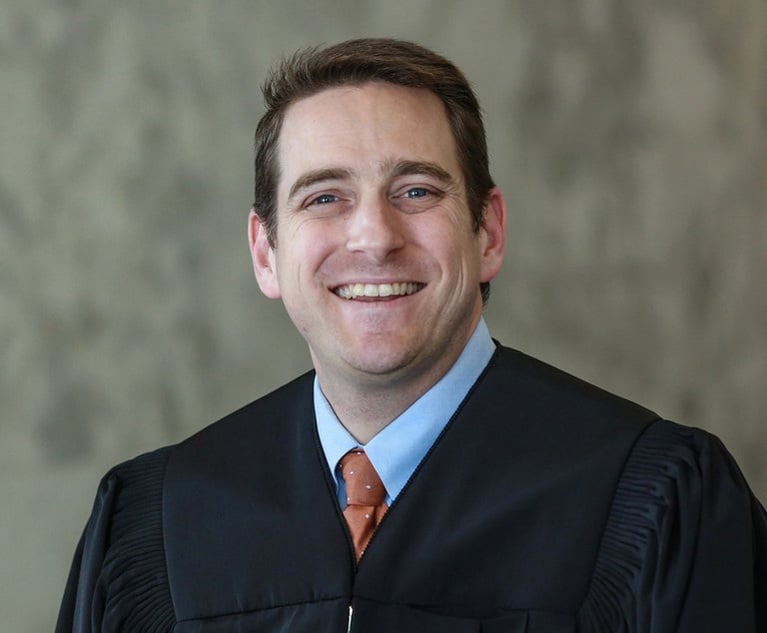NRA, Arguing Gun Shops Are 'Essential,' Sues New York Over Cuomo's COVID-19 Executive Order
The federal lawsuit comes nearly two weeks after Gov. Andrew Cuomo issued sweeping orders that mandated "nonessential" workers stay home.
April 03, 2020 at 12:32 PM
3 minute read
The original version of this story was published on New York Law Journal
 Photo Credit: Shutterstock.com
Photo Credit: Shutterstock.com
The National Rifle Association mounted a legal challenge against New York's coronavirus restrictions on Thursday, arguing the mandates are unconstitutionally vague and have required the closing of gun stores.
The federal lawsuit comes nearly two weeks after Gov. Andrew Cuomo issued sweeping orders that mandated "nonessential" workers stay home, a move that forced many businesses to close statewide and wreaked financial havoc on certain industries.
The executive order carved out an exception for essential workers and guidance from the state government classified a range of businesses under that definition.
The guidance did not explicitly list firearm and ammunition retailers as essential and officials interpreting the executive order have required "the closure of substantially all retailers of firearms and ammunition," according to the lawsuit.
It argues the executive order is overbroad and the closures are a pretextual attack on New Yorkers' Second Amendment rights.
"By closing federally licensed dealers, Defendants have cut off the only way of legally purchasing firearms in the State," the lawsuit argues. "As a result of the government's overreach, most New Yorkers have no legal way to exercise the constitutional right to purchase arms or ammunition."
New York Attorney General Letitia James issued a statement saying everyone must follow the law and all New York executive orders.
"We will aggressively defend the state against yet another legal assault by the NRA," she said in a statement.
The lawsuit is perhaps the most publicized challenge to Cuomo's sweeping order requiring nonessential workers to stay home. The order is aimed at limiting in-person interactions that can spread of the coronavirus, which state officials say has infected more than 92,300 people statewide and led to upward of 2,300 deaths.
New York remains the epicenter of the nation's coronavirus as the state marches closer to the virus' expected peak.
In the past, New York's three-term governor has highlighted that his efforts to control the spread of the disease have come without wide legal trouble.
Empire State Development, which issued the guidance on what would be classified as essential business, is listed as a defendant in the federal lawsuit, along with Cuomo.
The guidance from ESD listed a broad array of companies as essential, including grocery stores, laundromats and shipping services. The NRA lawsuit says sales of pizza, liquor and donuts have also been classified as "essential" by state officials.
"Yet, in the face of contrary federal guidance and ample constitutional authority, Governor Cuomo refuses to extend the same dispensation to firearm retailers," the lawsuit states.
The litigation points to a list of critical infrastructure from the U.S. Department of Homeland Security. The list included workers supporting "firearm or ammunition product manufacturers, retailers, importers, distributors, and shooting ranges."
According to the lawsuit, other states with coronavirus restrictions have signaled that gun stores can stay open.
This content has been archived. It is available through our partners, LexisNexis® and Bloomberg Law.
To view this content, please continue to their sites.
Not a Lexis Subscriber?
Subscribe Now
Not a Bloomberg Law Subscriber?
Subscribe Now
NOT FOR REPRINT
© 2025 ALM Global, LLC, All Rights Reserved. Request academic re-use from www.copyright.com. All other uses, submit a request to [email protected]. For more information visit Asset & Logo Licensing.
You Might Like
View All
Librarian's Termination Violated First Amendment Protections, Lawsuit Claims
3 minute read
Chicago Law Requiring Women, Minority Ownership Stake in Casinos Is Unconstitutional, New Suit Claims
5 minute read
Divided State Supreme Court Clears the Way for Child Sexual Abuse Cases Against Church, Schools
Trending Stories
- 1Snap Paid $63M in Fees to 2 Am Law 200 Firms in '24
- 2Lawyers Across Political Spectrum Launch Public Interest Team to Litigate Against Antisemitism
- 3Jones Day Names New Practice Leaders for Antitrust, Business and Tort Litigation and Latin America
- 4Russia’s Legal Sector Is Changing As Sanctions Take Their Toll
- 5Government Contracting Clients Look to Firms to Stay on Top of Trump Policy Changes
Who Got The Work
J. Brugh Lower of Gibbons has entered an appearance for industrial equipment supplier Devco Corporation in a pending trademark infringement lawsuit. The suit, accusing the defendant of selling knock-off Graco products, was filed Dec. 18 in New Jersey District Court by Rivkin Radler on behalf of Graco Inc. and Graco Minnesota. The case, assigned to U.S. District Judge Zahid N. Quraishi, is 3:24-cv-11294, Graco Inc. et al v. Devco Corporation.
Who Got The Work
Rebecca Maller-Stein and Kent A. Yalowitz of Arnold & Porter Kaye Scholer have entered their appearances for Hanaco Venture Capital and its executives, Lior Prosor and David Frankel, in a pending securities lawsuit. The action, filed on Dec. 24 in New York Southern District Court by Zell, Aron & Co. on behalf of Goldeneye Advisors, accuses the defendants of negligently and fraudulently managing the plaintiff's $1 million investment. The case, assigned to U.S. District Judge Vernon S. Broderick, is 1:24-cv-09918, Goldeneye Advisors, LLC v. Hanaco Venture Capital, Ltd. et al.
Who Got The Work
Attorneys from A&O Shearman has stepped in as defense counsel for Toronto-Dominion Bank and other defendants in a pending securities class action. The suit, filed Dec. 11 in New York Southern District Court by Bleichmar Fonti & Auld, accuses the defendants of concealing the bank's 'pervasive' deficiencies in regards to its compliance with the Bank Secrecy Act and the quality of its anti-money laundering controls. The case, assigned to U.S. District Judge Arun Subramanian, is 1:24-cv-09445, Gonzalez v. The Toronto-Dominion Bank et al.
Who Got The Work
Crown Castle International, a Pennsylvania company providing shared communications infrastructure, has turned to Luke D. Wolf of Gordon Rees Scully Mansukhani to fend off a pending breach-of-contract lawsuit. The court action, filed Nov. 25 in Michigan Eastern District Court by Hooper Hathaway PC on behalf of The Town Residences LLC, accuses Crown Castle of failing to transfer approximately $30,000 in utility payments from T-Mobile in breach of a roof-top lease and assignment agreement. The case, assigned to U.S. District Judge Susan K. Declercq, is 2:24-cv-13131, The Town Residences LLC v. T-Mobile US, Inc. et al.
Who Got The Work
Wilfred P. Coronato and Daniel M. Schwartz of McCarter & English have stepped in as defense counsel to Electrolux Home Products Inc. in a pending product liability lawsuit. The court action, filed Nov. 26 in New York Eastern District Court by Poulos Lopiccolo PC and Nagel Rice LLP on behalf of David Stern, alleges that the defendant's refrigerators’ drawers and shelving repeatedly break and fall apart within months after purchase. The case, assigned to U.S. District Judge Joan M. Azrack, is 2:24-cv-08204, Stern v. Electrolux Home Products, Inc.
Featured Firms
Law Offices of Gary Martin Hays & Associates, P.C.
(470) 294-1674
Law Offices of Mark E. Salomone
(857) 444-6468
Smith & Hassler
(713) 739-1250









